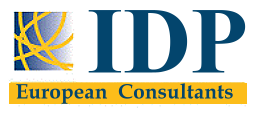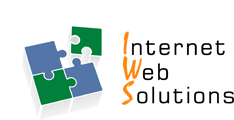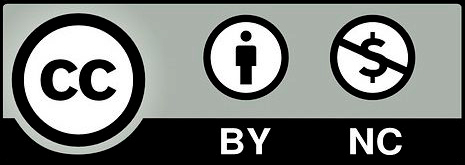#FinancialLiteracyforInclusion
News
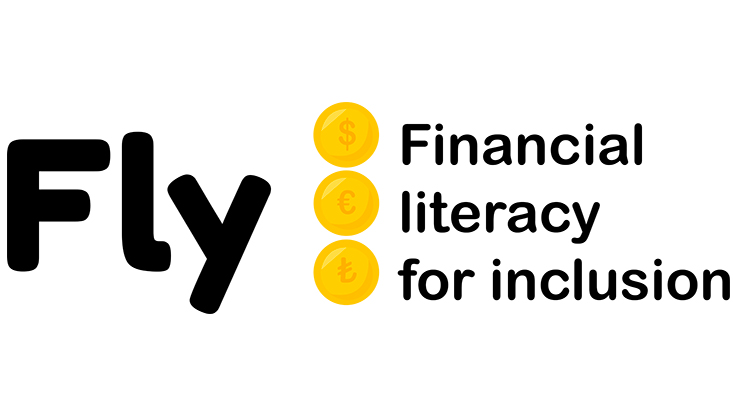
A Spotlight on Ethical and Sustainable Finance in Europe: Access the FLY Project’s Report on the OER Platform
The FLY Project, a co-funded initiative under the Erasmus+ Programme of the European Commission, is proud to announce the finalisation of Project Result 4 (PR4), with the development of the Report on Ethical and Sustainable Finance. This document marks a significant milestone in the project’s mission to enhance financial literacy and promote ethical and sustainable finance practices across Europe. The FLY Project, which united a consortium of eight partners from five different countries (Belgium, France, Italy, Spain, and Turkey), has been dedicated in offering materials and resources in five languages, making financial knowledge accessible to low-skilled adults, individuals of all age levels, and their families. The project’s core objectives included engaging low-skilled adults in acquiring basic financial knowledge, increasing financial awareness and self-reliance, and providing a guide for responsible money management with a focus on social and environmental impacts. PR4 was the focal point of the last steps of the project, representing the culmination of our research and analysis efforts within the “Financial Literacy for Inclusion” initiative. The report serves as a comprehensive and original investigation aimed at advancing our understanding of ethical and sustainable finance in the European context. Within the pages, readers will find valuable insights into the role of banking and finance, exploring the intricate relationship between social and ethical finance. It emphasises that finance, inherently neutral, can either generate negative externalities through speculative outcomes or promote positive externalities that lead to collective well-being. The research report carries a dual objective: • To uncover the essence of ethical finance while conducting a ground-breaking comparison of ethical and sustainable banks across Europe • To underscore the significance of ethical awareness in financial matters and how the choices made by financial institutions can significantly influence various facets of the tangible economy The FLY Project Consortium has undertaken an in-depth analysis of ethical and sustainable finance in Europe, focusing on several priorities, including: • Clarifying the meaning of ethical finance • Explaining the concept of sustainable finance • Creating a comprehensive map of distinctive ethical banks across Europe based on common criteria • Curating a collection of case studies and examples from Europe that highlight ethical and sustainable finance In essence, the Report is a comprehensive exploration designed to enhance the understanding of ethical and sustainable finance in Europe. It brings together a wealth of insights and analysis to promote a deeper understanding of its implications and potential transformations. The FLY Project Consortium invites all stakeholders, financial institutions, and individuals interested in ethical and sustainable finance to explore and utilise the insights contained within the Report on Ethical and Sustainable Finance. This report embodies our commitment to empower individuals and communities with the knowledge and tools needed to make informed, responsible financial decisions. For more information and to access the complete Report, please visit the FLY Project website at: www.fly-project.eu/report
Read more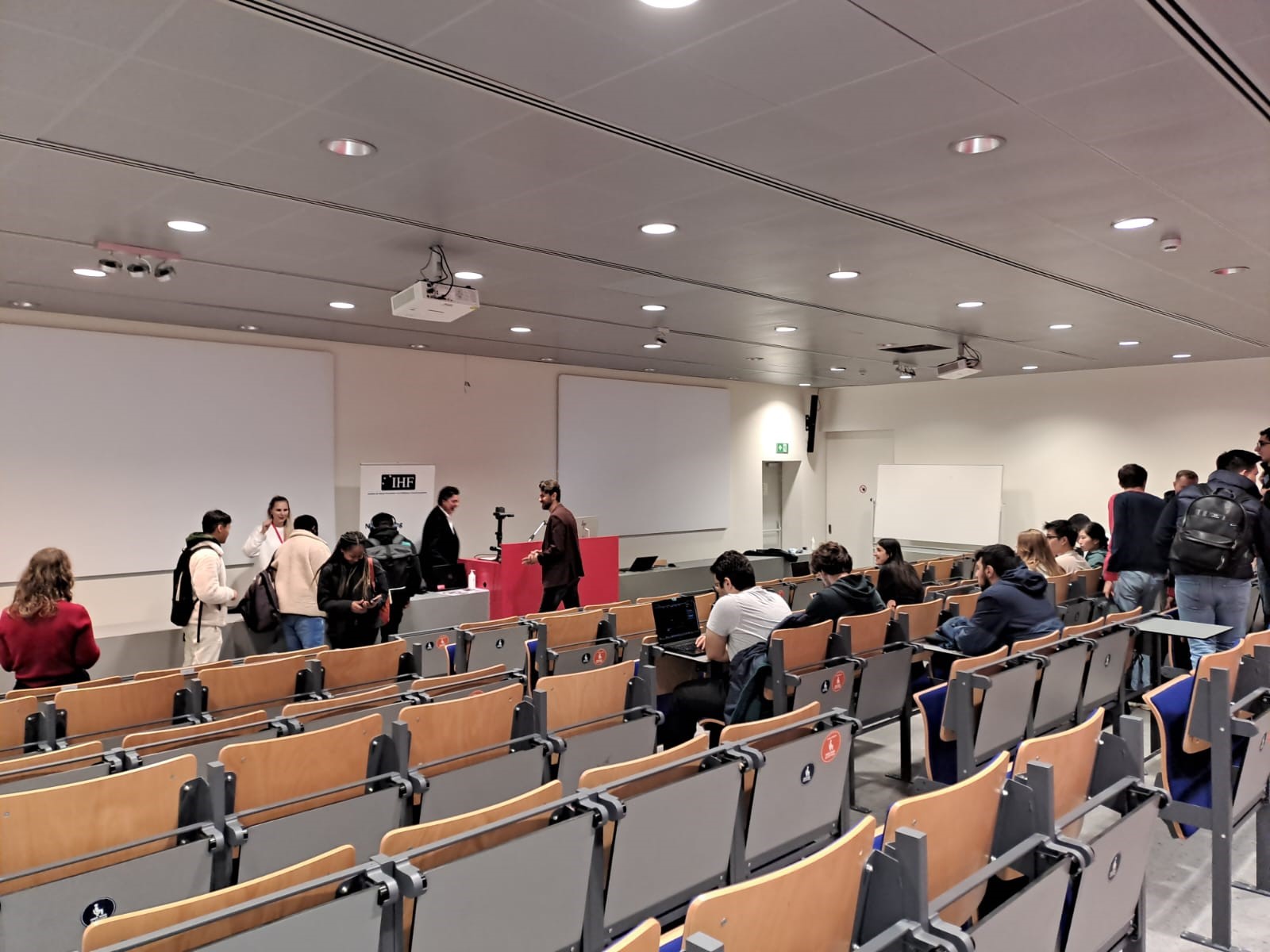
Enhancing International Visibility: IHF Hosted Its Second FLY Multiplier Event in October 2023 in Brussels
Brussels, Belgium - October 20, 2023. In a dynamic showcase of international network, IHF asbl hosted its second Multiplier Event for the FLY project on October 20, 2023, in Brussels, Belgium. Designed to resonate internationally, the event welcomed 15 international professionals specialising in education and training. Focused on Adult Education (AE), Lifelong Learning (LLL), finance, and sustainability, the diverse audience included representatives from IHF’s expansive international network, spanning AE institutes to organisations dedicated to social inclusion at both European and national levels. FLY, a co-funded initiative by the Erasmus+ Programme of the European Commission, brings together a consortium of 8 partners from Belgium, France, Italy, Spain, and Turkey. This transformative initiative seeks to empower low-skilled adults through comprehensive financial literacy training. The event kicked-off with a warm welcome and participant registration, leading into a comprehensive overview of the FLY project with details on partnership, project objectives, goals and impact and sustainability strategies. The agenda seamlessly transitioned to an exploration of the comprehensive WBS, highlighting key milestones, results, and deliverables, and providing attendees with a vivid understanding of the project’s progressive evolution. In a session on the project platform, IHF showcased the following key results: • FLY OER Platform • FLY Assessment Tool • FLY Training • Ethical and Sustainable Finance Report The interactive nature of the presentation sparked lively discussions. Participants actively engaged in an interactive session, seeking information, exchanging impressions and knowledge, and providing valuable informal feedback. Participants expressed interest, active engagement, and sincere appreciation for the project’s impactful deliverables. This second IHF Multiplier Event for the FLY project played a pivotal role in fostering international networking, facilitating knowledge exchange, and successfully internationally disseminating the project’s transformative results. For further details about the FLY project, please visit the project’s website (www.fly-project.eu) or contact IHF at operations@ihfeurope.eu
Read more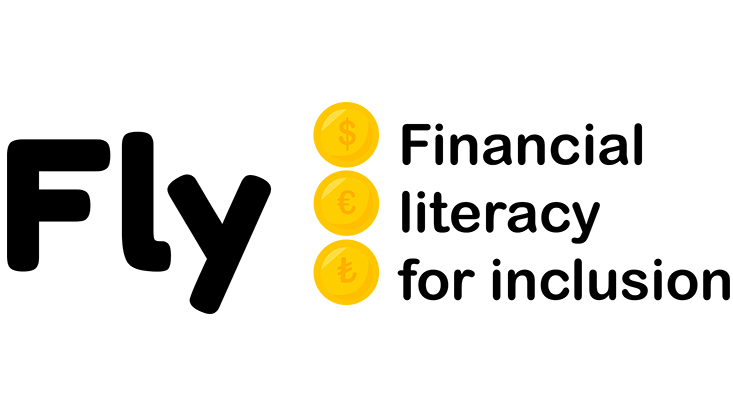
FLY PARTICIPATES IN THE PRESENTATION OF THE “15TH FINANCIAL EDUCATION WORKSHOPS FOR YOUNG PEOPLE” AND THE “15TH FINANCIAL OLYMPICS”
Among the events held on the occasion of Financial Education Week, the presentation of the "15th Financial Education Workshops for Young People" stood out. Members of the international Erasmus+ project FLY (Financial Literacy for Inclusion) participated in this event, represented by its coordinator in Malaga and Vice-Dean of the Faculty of Economics and Business Studies of the University of Malaga (UMA), Francisca García Lopera. This initiative, which will run until 15 March 2024, is designed for high school students and aims to bring this group closer to the world of finance. The "Financial Education Wotkshops for Young People" are included in the Edufinet project, developed by Unicaja and the Unicaja Banking Foundation, and take place online and in person at educational centres. FLY, an initiative co-financed by the European Union and managed in Malaga through the Vice-rectorate for International Mobility of the UMA, is collaborating in the project. During the presentation of the Workshops, the Eurobarometer data published by the European Commission was also presented, which reflects the need for improvement in financial education that Spanish population needs, as Spain appears at the bottom of the list of countries in terms of financial literacy. At the same time, the fifteenth edition of the “Financial Olimpics” was presented, a competition in which students can demonstrate the training acquired at the “Financial Education Workshops for Young People”. To learn more about Project FLY: https://fly-project.eu/
Read more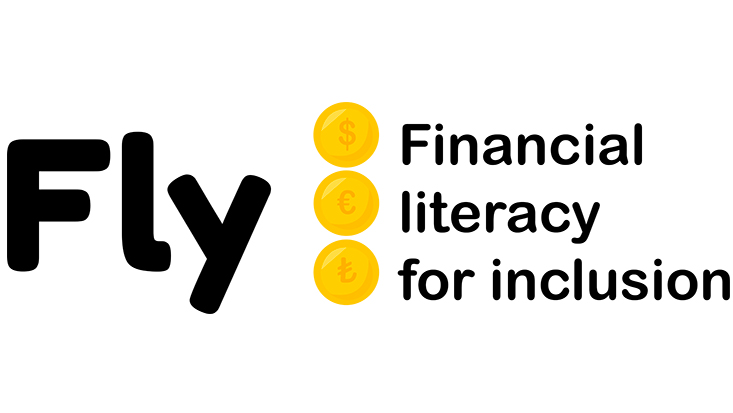
The University of Málaga, through the Erasmus+ FLY project, joins the commemorative events of the "financial education day".
The University of Málaga (UMA) joins the events organised on the first Monday of October throughout Spain, on the occasion of the "Financial Literacy Day", represented by the members of the international Erasmus+ project FLY (Financial Literacy for Inclusion - Financial Literacy for Inclusion). During this day, the FLY coordinator in Malaga and UMA teacher Francisca García Lopera, presented the main advances achieved by FLY, an initiative co-funded by the European Union and managed through the Vice-Rectorate for International Mobility of the UMA. More than a hundred people gathered at the auditorium of the University of Malaga in El Ejido for a training day on financial literacy, during which the most significant advances achieved by the consortium of eight organisations from five EU countries (Belgium, Spain, France, Italy and Turkey) that make up FLY were presented. The creation of a multilingual Open Educational Resources (OER) platform (with videos, checklists, infographics and tests); the offer of face-to-face courses aimed at the most vulnerable groups in the financial sphere; and the dissemination of regular reports on media literacy are some of the actions carried out in the last two years. Aspects such as financial security; identifying and evaluating situations related to the personal economy and the collective good; expanding notions about the value of money and savings or about the risk and needs of the economic decisions that are taken, whether they are savings, investment, indebtedness or transactions, for example, are some of the topics that FLY works on. The training aimed at the population with a lower level of financial knowledge, skills and competences is validated by experts in finance and digital technologies in adult education. Along with Professor García Lopera, José Antonio Díaz Campos and Francisco Carvajal Berrocal took part in the event, representing: the event's promoter, Edufinet Project of Unicaja Bank and Unicaja Foundation, and the Senior Business Advice Volunteers association Secot Málaga, respectively. Attendees also had the opportunity to participate in an interactive workshop organised by Google Malaga on digital skills and financial security. For further information about the FLY project: https://fly-project.eu/
Read more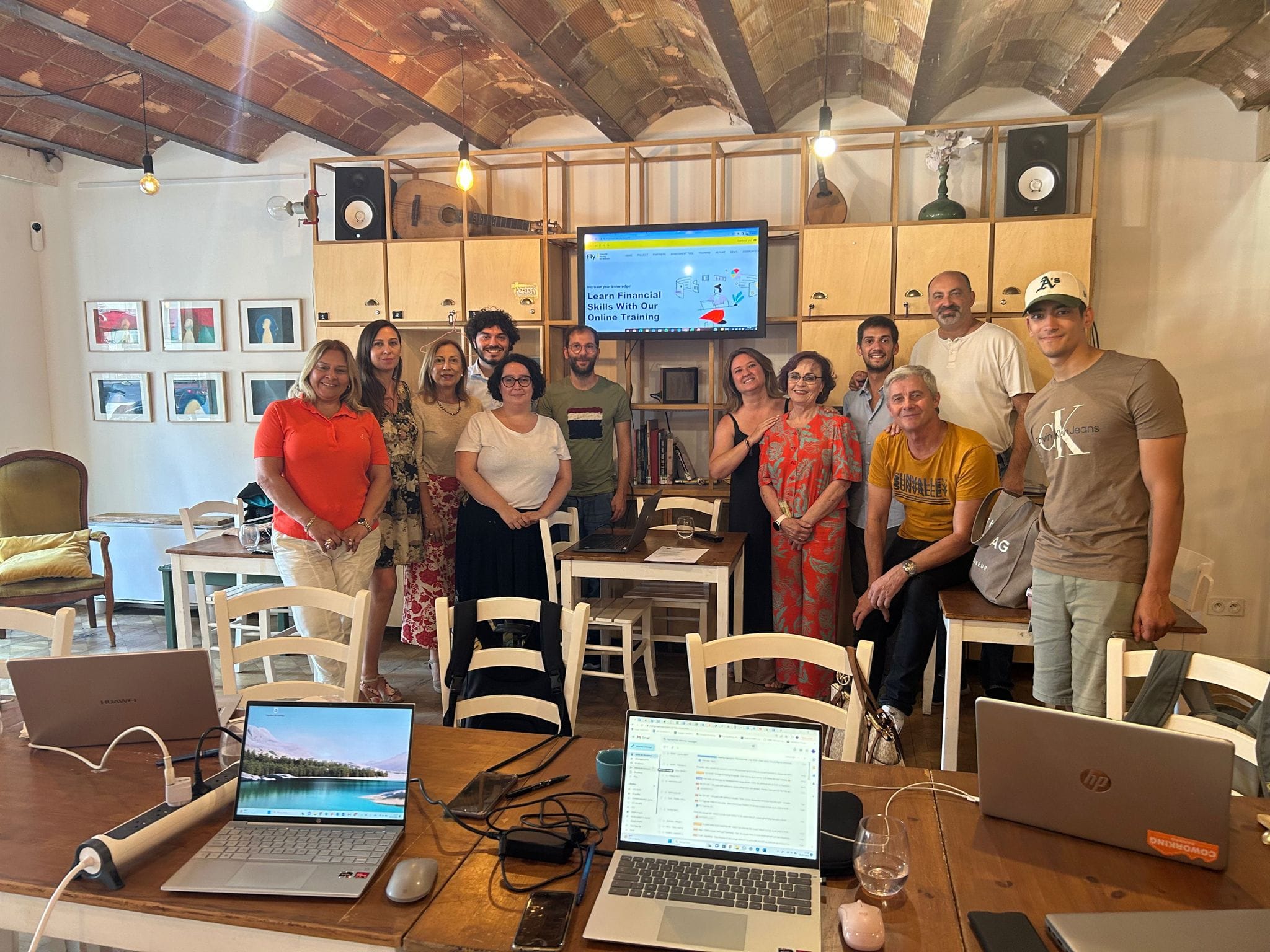
Financial Literacy for Inclusion: Partnership Engaged in the Successful Closing Meeting of FLY project
Marseille, France – July 5, 2023 – The city of Marseille set the stage for the Closing Meeting of the FLY Project (Financial Literacy for Inclusion). Bringing together partners from across Europe, the event marked the fruitful implementation of the project’s transformative journey towards enhancing financial literacy among low-skilled adults. The meeting served as a platform to discuss the positive status of the project, through the key milestones achieved, and the final steps required to successfully conclude it. FLY, a co-funded initiative by the Erasmus+ Programme of the European Commission, united a consortium of eight partners from five different countries (Belgium, France, Italy, Spain and Turkey). During the Closing Meeting, hosted by the project coordinator, the consortium delved into a thorough exploration of the remarkable results and outcomes achieved by the project. The discussions revolved around key highlights, focusing on the invaluable findings and insights obtained through an extensive analysis of the project’s platform. In this regard, a video demo was presented on how to use the platform and the project deliverables – freely and publicly available on YouTube at the link: https://youtu.be/HE1j8TtM-74 The meeting then continued with the discussion of the upcoming project’s tasks and specifically partners coordinated on the finalisation of the last project results (PR4) with the finalisation of the Report on Ethical and Sustainable Finance. Alongside this last project deliverable, the consortium dedicated substantial attention to discussing the final horizontal activities essential for ensuring the continued success of the project. This included deliberations on organising Multiplier Events and implementing strategies for effectively sharing and promoting the project, as well as upholding the highest standards of quality throughout the implementation process. The attendees actively participated in the discussions, sharing valuable insights, and ensuring a collaborative environment conducive to the successful completion of the project. For further information on FLY project: https://www.fly-project.eu/index.php?lang=EN
Read more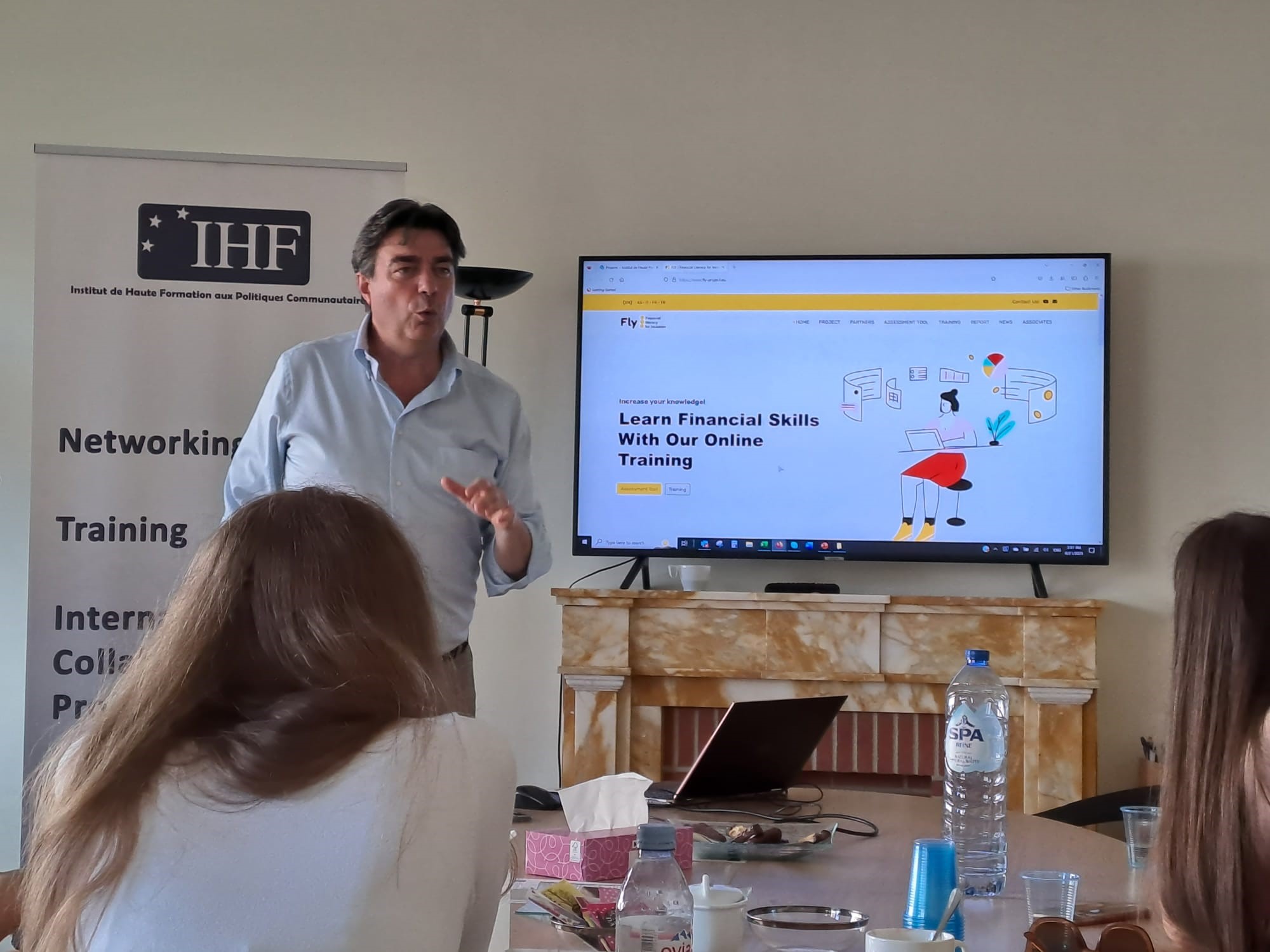
FLY Project’s Multiplier Event in Brussels Celebrates Success in Enhancing Financial Literacy
Brussels, Belgium - June 21, 2023 The FLY Multiplier Event, held at the IHF’s premises in Brussels, Belgium, marked the successful implementation of the project’s transformative journey towards enhancing financial literacy among low-skilled adults. The event served as a pivotal platform to discuss the positive status of the FLY project with an international cohort, highlighting key milestones achieved and outlining the final steps required for a successful conclusion. FLY, a co-funded initiative by the Erasmus+ Programme of the European Commission, unites a consortium of 8 partners from five different countries (Belgium, France, Italy, Spain, and Turkey). The project aims to empower low-skilled adults by providing comprehensive financial literacy training, with a focus on lifelong learning, finance, and sustainability. The face-to-face international workshop, organised by IHF, gathered 5 international and 3 local practitioners, creating a dynamic space for engaging discussions on the project’s objectives and results. The event began with a warm welcome and registration of the participants, followed by a comprehensive presentation of the FLY project. IHF introduced the project’s background, partnership composition, and structure. Specific objectives, anticipated impact, and long-term sustainability strategies were thoroughly discussed. The agenda included an in-depth overview of the Work Breakdown Structure (WBS), highlighting achievements and deliverables. IHF then presented the next and final stages of the project evolution and implementation, providing a roadmap for the project’s future. Presentations on project results included a detailed exploration of the OER platform, Assessment Tool, and FLY Training Material. Participants engaged in discussions, seeking clarifications during the interactive Q&A session. The success of the event was evident in the high level of participant satisfaction. Genuine interest in the FLY initiative was expressed, and participants committed to disseminating project results within their international and professional networks. For more information on the FLY project, visit the project's website (www.fly-project.eu) or contact IHF at: operations@ihfeurope.eu
Read more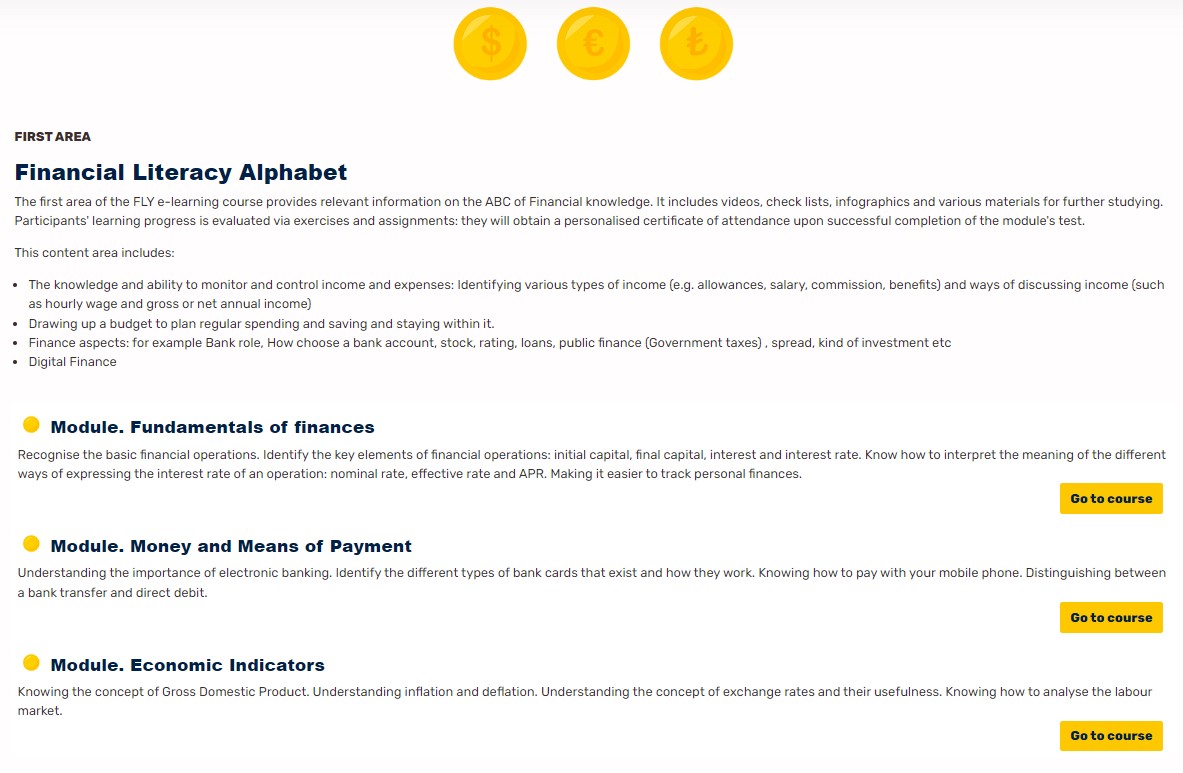
THE FLY PROJECT OFFERS ONLINE TRAINING ON FINANCIAL EDUCATION THROUGH AN OPEN EDUCATIONAL RESOURCES PLATFORM.
The international Erasmus+ financial literacy project FLY - Financial Literacy for Inclusion, co-financed by the European Union, has now launched its training section https://www.fly-project.eu/training.php?lang=EN with all the training material developed by the project partners, through the Open Educational Resources Platform (OER). With this initiative, all the courses designed to promote financial security are available to the public free of charge Users can access all the training material completely free of charge and without prior registration, through the link: https://www.fly-project.eu/training.php?lang=EN and easily navigate through the different modules and training areas, which will provide the keys to optimise the use of money and achieve greater autonomy in basic financial matters. This resource is aimed at anyone who wants to acquire the skills to identify and assess situations related to their personal finances and make their own financial decisions. The content of the new online training tool is available in a multilingual version, having been translated into the five languages of the FLY project (English, Spanish, Italian, French and Turkish); and is divided into three main areas: Financial Literacy Alphabet; Financial Decision-Making and Management; and Finances for Good. In the FIRST AREA, Financial Literacy Alphabet, the following modules are covered: Module 1: Fundamentals of finances; Module 2: Money and Means of Payment; Module 3: Economic Indicators. In the SECOND AREA: Financial Decision-Making and Management, the modules: Module 4. Savings products: deposits; Module 5. Financing options, credits and loans; Module 6. Family / personal budget management; Module 7. Special products (i.e., reverse mortgage). And in the THIRD AREA: Finances for Good, you will learn about the modules: Module 8: Financial advisory; Module 9: Risks and Dangers of Finance; Module 10: Ethical finance for a just society. Through different training resources such as infographics, presentations, self-assessment tests, and a tool specially designed to measure the user's financial knowledge, citizens can broaden their notions about the value of money and savings or about risk and the real needs of their economic decisions, be they savings, investment, indebtedness or transactions, for example. This training, validated by experts in the field, is aimed at targeting the best financial actions that have an impact on the preservation of the environment at the individual level. The OER platform that hosts this material, as one of the pillars of the FLY project, as well as the rest of the project results, is developed by a consortium of eight organisations from five European countries (Belgium, Spain, France, Italy and Turkey). From a digital transformation perspective, this group addresses financial literacy by supporting the use of digital technologies in adult education and promoting new learning opportunities, especially for people who need a higher level of financial knowledge, skills and competences. The partners are currently engaged in the Testing and Validation phase of the training content, with a target of 140 final beneficiaries, including representatives of the target groups, professionals and educators, as a matter of fact, the curriculum will be delivered transnationally to a cohort of targets’ representatives and stakeholders of interest (i.e., both direct beneficiaries of the training content as well as other stakeholders operating in the fields of Adult education, digital and media literacy, etc.). An internal and common project plan for the roll-out in pilot version of the training content has agreed on by partners. Find out more about Project FLY: https://fly-project.eu/
Read more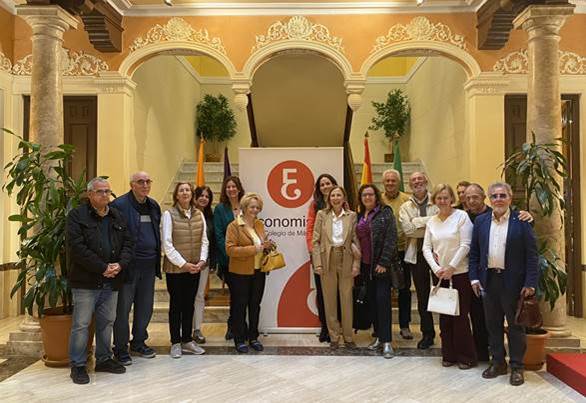
Promoting financial literacy for the elderly through the FLY project
The Professional Association of Economists of Malaga has hosted a training day on financial education by the Erasmus+ FLY project (Financial Literacy for Inclusion), which aims to improve the financial literacy of adults. This training offers tools for making daily decisions concerning the economy of citizens, aiming to maintain and improve their autonomy, security and financial stability. The coincidence of this training action with the International Working Women's Day, March 8, was intended to highlight the importance of this type of actions for the female collective, as women are generally the main managers of family expenses, without usually having been provided with a minimum financial education, especially in the case of the older generations. The training was given by the financial advisors, members of the Professional Association of Economists of Malaga, Mrs. Elisa Negro Martínez and Mrs. Gema Rojo Pérez, while the session was presented by the coordinator of the FLY project at the University of Malaga, Professor Francisca García Lopera. This initiative is part of a program of periodic sessions aimed at the population free of charge that will be developed throughout the year. Financial Education for Inclusion Project The FLY project, co-financed by the European Union, is being developed by a consortium of 8 organizations belonging to five European Union countries (Belgium, Spain, France, Italy and Turkey), with the University of Malaga being the partner responsible for the coordination and development of the training package, the core product of the project. FLY is supported by a multilingual Open Educational Resources (OER) Platform, anonymously accessible, free and permanently available, which offers a practical and intuitive online tool for each person to self-assess their financial knowledge, an attractive and simple training, easy to access that facilitates people without financial training to better manage their money and make prudent and wise financial decisions, thus obtaining benefits both individually and socially. Thanks to FLY, individuals can gain a better understanding of the value of money and savings, plan their economic decisions with the essential skills to identify and evaluate situations related to their personal finances, and make financial decisions aware of the associated risks and rewards. The FLY platform also offers reports on ethical finance with the aim of moving towards a more sustainable and socially sensitive financial environment by making people more aware of the impact of their financial decisions, not only for themselves, but also for society and the global planet. To learn more about Project FLY: https://fly-project.eu/
Read more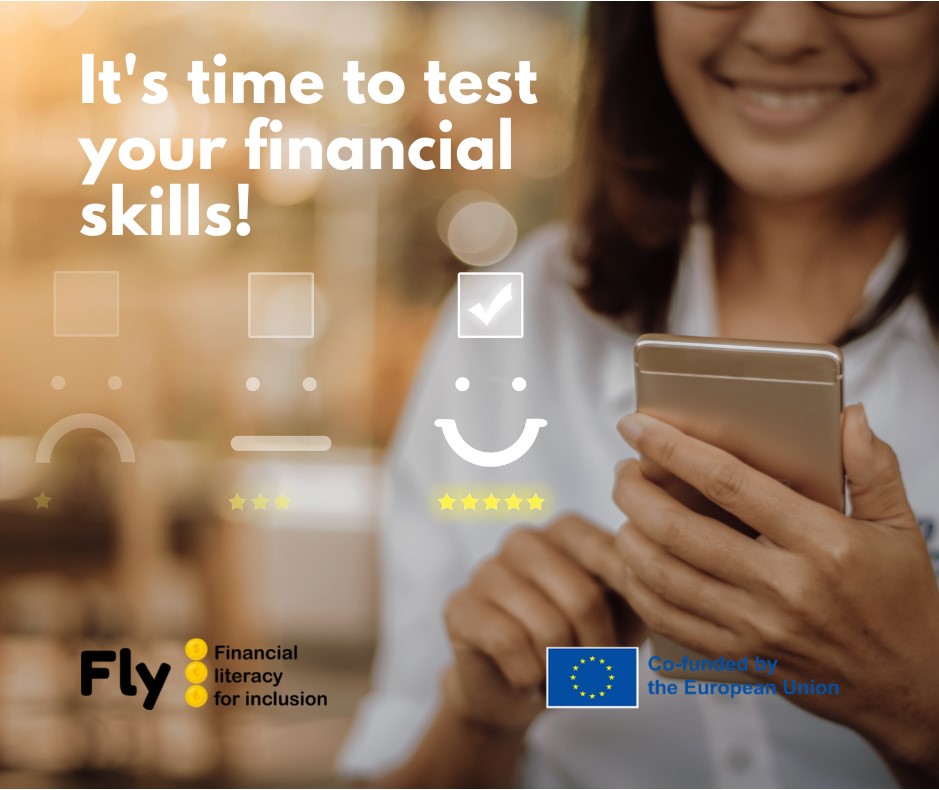
Financial Literacy for Inclusion: A Practical Tool to Assess Financial Literacy
We are happy to announce that the self-assessment tool for basic financial competences is now available online! The tool has been developed within the project 'Fly - Financial literacy for inclusion', funded by the European Commission's Erasmus+ program. Why do we provide a tool to assess financial literacy? Financial literacy is an essential life skill. We need financial competences for a number of activities we do every day or for taking financial decisions, such as deciding at which bank open an account, which mortgage to choose or how to invest our savings. Financial literacy also protects against over-indebtedness, excessive risk-taking, fraud. Yet, according to the 2020 OECD (an international body for economic development and cooperation) survey on adult financial literacy, about half of the EU adult population lacks of sufficient financial knowledge. The Fly project's self-assessment tool is therefore a key part of the learning pathway offered by the platform. Through 15 multiple-choice questions, skills are tested on topics such as: inflation, simple and compound interest rates and how to calculate them, budgeting, gross and net income, payment instruments and their characteristics, and much more. In the final version of the platform, after having taken the self-assessment test, specific training courses which are in process of preparation will be recommended to the users. Test your financial skills now by taking FLY's self-assessment test, which can be accessed via the following link > SELF-ASSESSMENT TOOL Additional resources and tool for the assessment of the level of financial literacy have been selected by FLY partners from those already available online and collected in the REPOSITORY section. For more information on the FLY project visit https://fly-project.eu/
Read more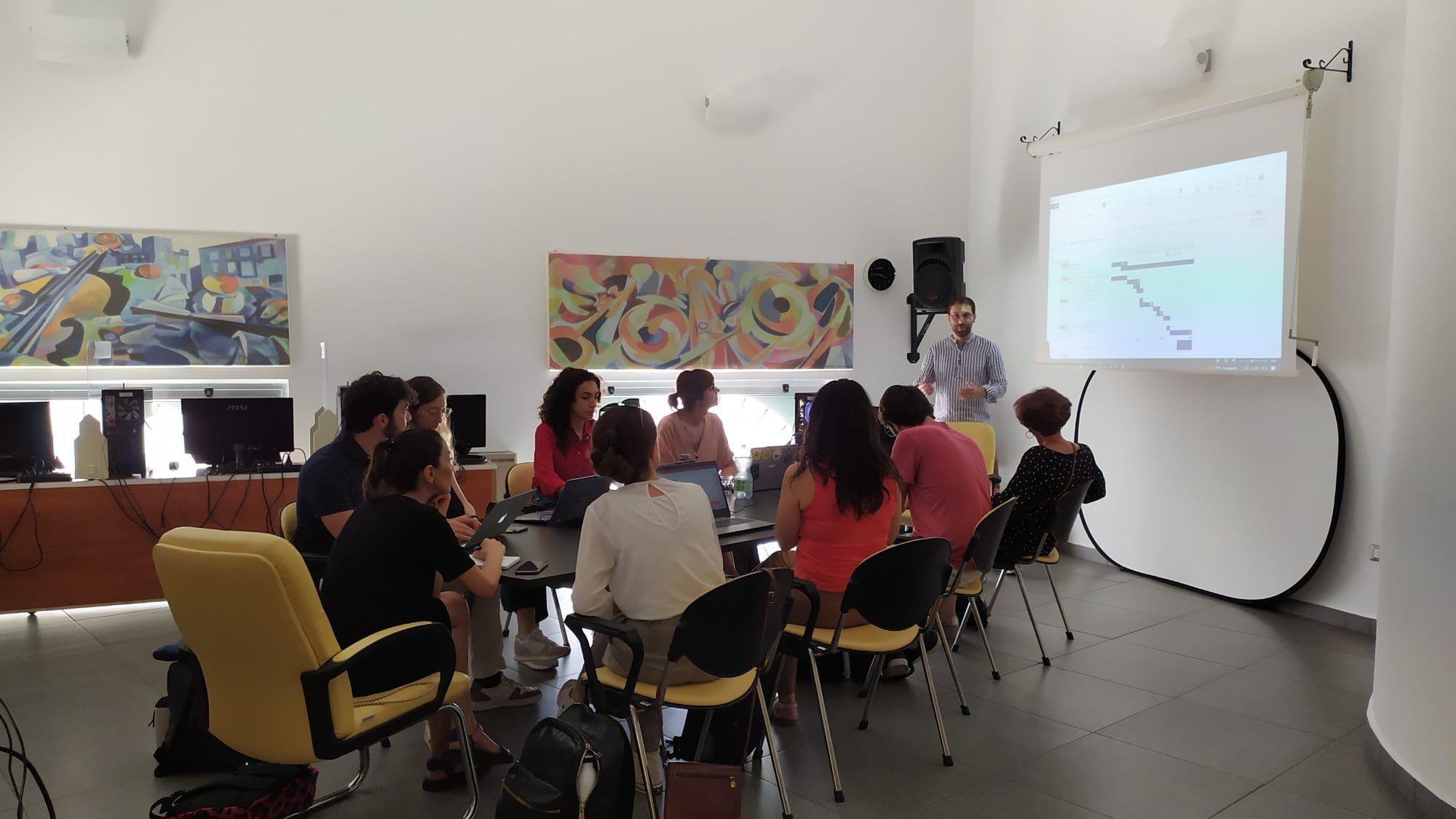
Financial Literacy for Inclusion: Consortium joined the second Transnational Project Meeting of FLY.
On July 1st, 2022, the consortium joined the second TPM of FLY (Financial literacy for inclusion), a Project co-funded by the Erasmus+ Programme of the European Commission, which brings together 8 Partners from 5 different countries (Belgium, France, Italy, Spain and Turkey). The Meeting, hosted by Fuori Dal Sommerso, took place in Mesagne, Italy. During the meeting, the consortium discussed the overall progression of Project Result 1 (OER Platform), Project Result 2 (SAT, a practical tool to assess financial literacy), and organised the distribution of work for the implementation of the Project Result 3, which will be the development of training courses aimed at improving the financial literacy of low skilled adults. FLY’s objective is to create financial culture among adults low skilled engaging them in learning financial. Having a financial culture will help them to make positive choices for themselves and for society also from an environmental point of view. FLY develops and deploys a simple guide within everyone's reach to find the best way to use money, paying attention to the impact it has not only on our lives, but also on those of others and on our planet. On the basis of that, in the following two years FLY will sustain the development among adults low skilled of financial literacy, providing all citizens with some of the tools that are indispensable today to build a peaceful, safe and sustainable future for themselves, their families and the planet; its innovative methodology relies on demand-drive and bottom-up approaches that will lead partners in the creation of several strategic results: 1. Fly Platform (OER Platform) in Multilanguage version 2. A Practical Tool to Assess Financial Literacy 3. FLY Free Financial learning for low skilled Adults 4. Ethical and Sustainable Finance in Europe, a report During the meeting, the consortium discussed the overall project implementation schedule, defining timelines and respective duties in the following months. For further information on FLY project: https://fly-project.eu/
Read more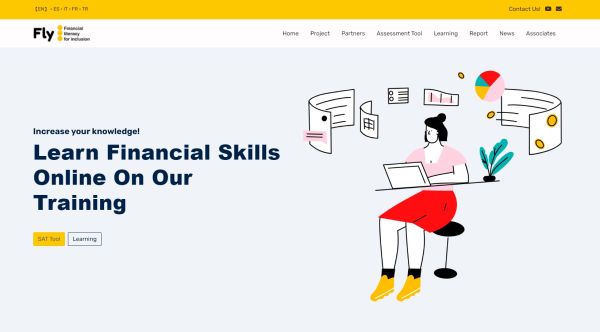
Financial Literacy for Inclusion: FLY website is now available online
FLY is a Project co-funded by the Erasmus+ Programme of the European Commission that aims at the creation of financial culture among adults low skilled engaging them in learning financial. FLY will sustain the development among adults low skilled of financial literacy, providing all citizens with some of the tools that are indispensable today to build a peaceful, safe and sustainable future for themselves, their families and the planet. The project officially kick-started in February with the first online transnational meeting during which partners had a great opportunity to discuss the overall project implementation schedule, define timelines and respective duties in the following months. One of the very first activities was the development, testing and implementation of the Open Educational Resources (OER) Platform. Fly Platform is the main showcase of project’s results and its largest and most tangible channel for international visibility, and is available in 5 languages (EN, ES, IT, FR, TR) with all of its content completely available for free, without requiring any kind of registration/identification by the user. FLY website is now online at https://fly-project.eu/. For the next two years, the Platform will host and integrate all the main achievements of the consortium; each section of the Fly Platform is a stand-alone library of its corresponding output. The “Assessment Tool” section will contain a practical tool for assessing financial literacy to measure financial knowledge, behaviour and attitudes, which will be useful for comparing levels of financial literacy and financial inclusion across countries. The FLY Free Financial learning for adults low skilled training courses will be published in “Learning”; the content will be fully available for free and the learning areas will be (1) Financial Literacy Alphabet, (2) Risk and dangers, and (3) Finance for Good. The “Report” section will host the report “Ethical and Sustainable Finance in Europe”. This output will be very strategic to better understand the role of the Bank and finance and the role of social and ethical finance. In addition, the "Associates" section will be relevant to the widespread impact of the project, as organisations interested in the project will be able to join the FLY community and become associated partners. For further information about FLY project, explore the website: https://fly-project.eu/
Read more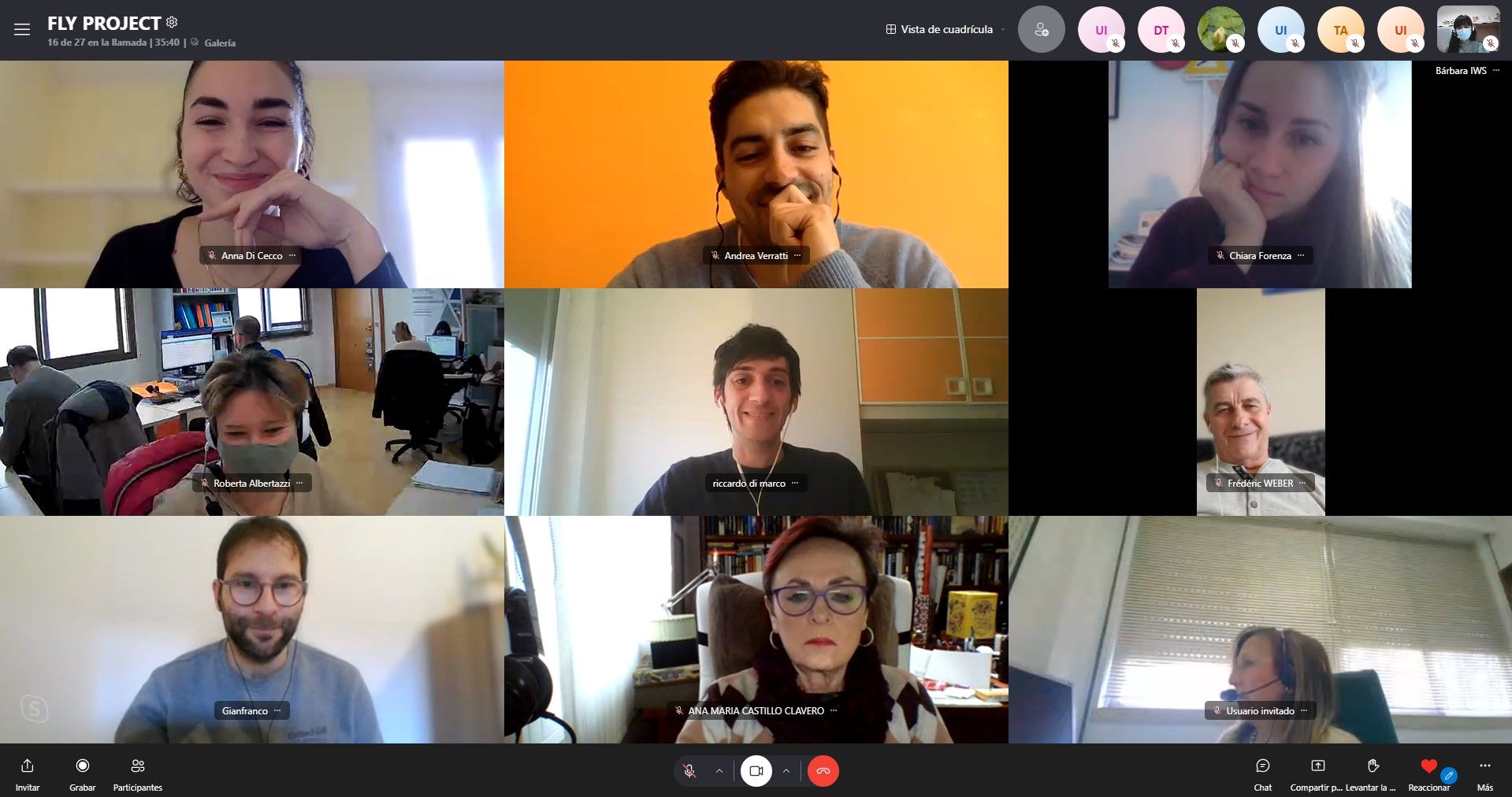
FLY Project has been officially launched
On February 2nd, 2022, the consortium joined the online Kick-Off Meeting of FLY (Financial literacy for inclusion), a Project co-funded by the Erasmus+ Programme of the European Commission, which brings together 8 Partners from 5 different countries (Belgium, France, Italy, Spain and Turkey). The Kick-Off Meeting, hosted by Association FenêtreS (Rhône-Alpes – FR), was originally planned in Tassin la Demi-Lune, but has been rescheduled online due to COVID-19 restrictions. FLY’s objective is to create financial culture among adults low skilled engaging them in learning financial. Having a financial culture will help them to make positive choices for themselves and for society also from an environmental point of view. FLY develops and deploys a simple guide within everyone's reach to find the best way to use money, paying attention to the impact it has not only on our lives, but also on those of others and on our planet. The OECD’s Principles and Good Practices for Financial Education and Awareness recommend that financial education must be available for all and should start as early as possible and be taught in schools. Including financial education as part of the curriculum in school (all levels) is a fair and efficient policy tool. Financial iliteracy crosses all economic boundaries from low-income to high-income families, and even well-educated, high-income adults may not know how to budget properly or manage their money well. According to Global Attractiveness Index 2020 Financial literacy is highest between the ages of 35 and 44; it is low in people under the age of 35 and very low in adult low skilled (over 50). On the basis of that, in the following two years FLY will sustain the development among adults low skilled of financial literacy, providing all citizens with some of the tools that are indispensable today to build a peaceful, safe and sustainable future for themselves, their families and the planet; its innovative methodology relies on demand-drive and bottom up approaches that will lead partners in the creation of several strategic results: 1. Fly Platform (OER Platform) in Multilanguage version 2. A Practical Tool to Assess Financial Literacy 3. FLY Free Financial learning for Adults low skilled 4. Ethical and Sustainable Finance in Europe, a report During the meeting, the consortium discussed the overall project implementation schedule, defining timelines and respective duties in the following months. The FLY official website will represent a repository of the project’s outputs, results, news and contacts. A Practical Tool to Assess Financial Literacy will be designed with the aim of measure the financial knowledge, behaviour and attitudes, useful to compare levels of financial literacy and financial inclusion across countries; and on which the 2 subsequent project results will be based, the creation of the FLY Free Financial learning for adults low skilled training courses, and the Ethical and Sustainable Finance in Europe report. For further information about FLY project: https://fly-project.eu/
Read more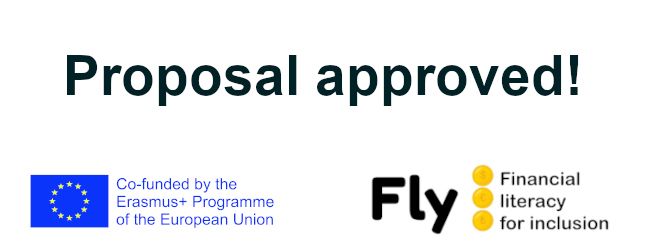
Financial Literacy for Inclusion: the FLY proposal has been approved
On October 27th, the French Erasmus+ National Agency communicated the approval of the FLY – Financial Literacy for Inclusion proposal, under the KA2 Cooperation partnerships in adult education. According to Global Attractiveness Index 2020 Financial literacy is highest between the ages of 35 and 44; it is low in people under the age of 35 and very low in adult low skilled (over 50). In addition, the OECD’s Principles and Good Practices for Financial Education and Awareness recommend that financial education must be available for all and should start as early as possible and be taught in schools. On the basis of that, FLY’s objective is to create financial culture among adults low skilled engaging them in learning financial. Having a financial culture will help them to make positive choices for themselves and for society also from an environmental point of view. In the following two years FLY will sustain the development among adults low skilled of financial literacy, providing all citizens with some of the tools that are indispensable today to build a peaceful, safe and sustainable future for themselves, their families and the planet. The FLY project tackles the European Commission's horizontal priority of addressing digital transformation through development of digital readiness, resilience and capacity. Specifically: 1. FLY will support active citizenship and ethics in lifelong learning. 2. FLY will support the use of digital technologies in education of adults, learning, assessment and engagement. 3. FLY promote new adult education opportunities, particularly for adults with a low level of skills, knowledge and competences. FLY will be co-funded by the Erasmus+ Programme of the European Commission and will last 24 months between 2021/23. The project has been submitted and will be implemented by a partnership of eight organisations from five European countries (Belgium, France, Italy, Spain and Turkey). For further information about the project and its partners: https://fly-project.eu/
Read more



